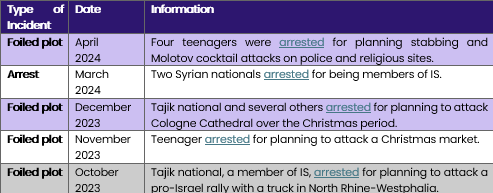Germany will host the 2024 UEFA European Football Championship until 14 July. During this period, numerous security concerns are likely to impact travel and operations across Germany. Most concerningly, the tournament has already attracted violence and is likely to be a key target for Islamist extremists.
On 14 June, Germany commenced the 2024 Euros, which will run until 14 July. At least 2.3 million fans will travel to Germany for the tournament.
In preparation for the event, over 22,000 federal police officers have been deployed, the largest operation in the force’s history according to local media. In an acknowledgement of security threats, including terrorism and hooliganism, German authorities have increased border checks and temporarily applied restrictions to the Schengen area.
Cities across the country will host matches, including Berlin, Cologne, Dortmund, Düsseldorf, Frankfurt, Gelsenkirchen, Hamburg, Leipzig, Munich and Stuttgart.
The primary threat for the Euros is that of terrorism, specifically from Islamic State Khorasan Province (ISKP; the Central Asia offshoot). ISKP has increased its operations in Europe, aiming to increase its notoriety, financing and recruitment through high-profile attacks.
Germany has already seen considerable IS activity. Over 22 incidents have been recorded in the country since June 2023 (including arrests and foiled plots: see Figure 1). IS and its affiliates previously threatened the Champions League and have targeted the Euros. Recently, a German dual national was arrested in Cologne for transferring money to IS after his application to be a security guard at the Euros was declined.
There have been incidents at the games already. On Sunday police shot a man armed with an axe and a Molotov cocktail in Hamburg, hours before the Netherlands-Poland game. A couple of days prior, a knifeman was shot and injured by police after indiscriminately stabbing people at a Euros party in Magdeburg.
ISKP’s capabilities range from small arms to IEDs: nevertheless, these organised attacks require planning and coordination, increasing their likelihood of being foiled by authorities. Lone-wolf attacks meanwhile pose a significant challenge: these are harder to prevent and are the most likely threat, typically involving bladed weapons or vehicle ramming. High-risk locations include near the stadiums hosting games, as well as busy streets and fan zones in the vicinity. Bars and pubs showing the games face increased risk due to higher customer numbers (and likely reduced security), making them attractive targets.

Large crowds are likely to attract opportunistic criminals and pickpockets. Threats are highest at the major public transport hubs, queues at stadiums, and busy venues broadcasting the games.
Leave a comment below or ask us directly. For more information on our bespoke risk management services, book a call today. Order custom analyst papers like our Traveller Insight to stay informed and ahead of the curve.